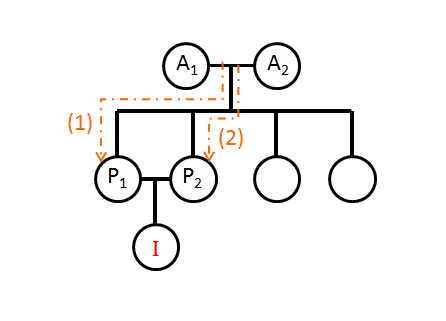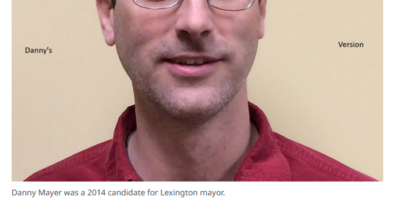For the good of Lexington, and indeed all the citizens of Kentucky, the Lexington-Fayette Urban County Government should secede from the Commonwealth and declare itself an independent federal district.
There are excellent reasons to do this. First, there’s politics. As the general election of November 5 made clear, what Lexington voters want and what voters elsewhere in the state want are entirely different things. Of the 709,577 votes cast for governor-elect Andy Beshear, Fayette County voters cast 73,397. That’s slightly more than 10 percent of Beshear’s tally. However, Lexington’s population of 323,780 is only seven percent of Kentucky’s estimated population of 4,468,402.
What this means is that Lexington, along with Jefferson County (186,510 votes for Beshear), has an influence on state politics that is largely opposed by the rest of the state. Had Fayette and Jefferson Counties both submitted vote tallies equally split, 50-50, between Beshear and incumbent Matt Bevin, approximately 64,000 votes would have swung to Bevin, who then would have won the election convincingly, roughly 768,000 to 645,000.
Thus while residents of Lexington and Louisville might congratulate themselves on a narrow escape from four more years of Bevin’s boorishness, residents of the remaining 118 counties have good reason to be angry. They don’t want what we sophisticated urbanites want, and we know that a great many of them are armed to the teeth. Should we be afraid? Probably.
Part of the problem here— the disconnect—is that we don’t even understand why the rural dwellers of the Commonwealth don’t want what we think they should want. For example, as the New York Times documented last year, eastern Kentucky counties such as Harlan, the focus of the Times article, receive more federal assistance than nearly anywhere else in the nation, but then proceed to complain about all the help they get. And on November 5, 69 percent of Harlanites voted for Bevin, presumably in an attempt to send all that help straight back from whence it came.
Well, one of the whences from which it came is Fayette County. Our median household income is $53K. Harlan’s is $24K. 18.6 percent of Lexingtonians live below the poverty line, compared to 41.5 percent of Harlanites. Frankly, they seem ungrateful. We pay in, they take out. We deserve better. And by declaring ourselves independent of these economic drags, we can at least be rid of whatever state-level assistance we’re providing. No, I don’t know how, not personally, but I’m sure there’s someone around who knows the art of the deal. We could just charge more, or something. Doesn’t matter. We’ll get our best people on it.
Then there’s education. Here in Lexington, we have a lot of it. We’re the 25th best educated city in the country, in fact. We have good-ish K-12 schools, a flagship university, and lots of hospitals full of lots of doctors and nurses. But the rest of the state? Not so much. Depending on who’s counting what—take your pick—Kentucky ranks anywhere from below-average to near the bottom. Never the worst, mind you: there will always be a Mississippi. But imagine how poorly Kentucky would rate in national assessments without Lexington to carry it higher? One shudders to think.
And more than test scores, this is about pride. Think about all the stereotypes assigned to Kentuckians. I don’t need to list them here: you know what they are. But do they apply to Lexington? No, they don’t. They apply to everywhere in Kentucky except Lexington.

I can sense your hesitation, so here’s proof. In fact social scientists are coming to realize that stereotypes, despite their damaging effects, often are rooted in “a kernel of truth.” So perform this thought experiment: if you live in or near Lexington, first think of a few pernicious Kentucky stereotypes, then think about how many fellow Lexingtonians you know who actually embody those stereotypes. Not many, eh? Maybe none. Therefore, by the principle of exclusion, if the stereotypes don’t apply to Lexington, they must apply to everywhere else in Kentucky. Q.E.D.
So that’s the case for secession. I could go on: Lexington is healthier than the rest of the state, for instance, and much more multicultural, with the obvious advantages those metrics bring, like better restaurants and subtitled art-house films. But how would this secession actually work? What would an independent LFUCG look like?
One option is that Lexington becomes a fully independent city-state, in the style of Singapore, the Vatican, or Danzig before the war. This is appealing in the abstract, as we’d be beholden to no nation, maintaining our own currency and armed forces. But the problems are tangible and obvious: while the advent of crypto-currencies such as Bitcoin solves the money problem, it would be difficult to raise a standing army of sufficient force to withstand a coordinated assault by our neighbors, in particular the counties of Anderson, Clark, and Jessamine, the residents of which have precious little to lose. Singapore manages this problem by virtue of its large (5+ million) population, while the Vatican has the backing of the ferocious, never-say-die Roman Catholic Church. But of course Danzig fell. Twice. We don’t want to be Danzig.
A better option would be to transition into a semi-autonomous city-state, à la Hong Kong. We’d enjoy the protection of the United States armed forces, but govern ourselves both politically and economically. This is appealing in the short term, but of course in the long there would likely arise a “One Kentucky” movement, as the rest of the state, envious of our civil freedoms and high standard of living, would seek to annex us, leaving Lexington right back where it started.
Thus the best option is to join Washington, D.C. as a federally administered district, governed by the mayor and city council, and answering not to Frankfort, but to the U.S. Congress. This transition could be implemented with the least fuss, but does come with a very significant concession.
Like the District of Columbia, we in Fayette County would have to sacrifice our political representation in Washington while still paying federal taxes. This of course has long been a source of discontent for D.C. residents, but in our case, practical considerations may win the day. To start with, is there truly any difference between Andy Barr and having no representative at all? Beyond tweeting photographs of himself posing at VFWs and VA hospitals across KY-6, I challenge any resident of Lexington to explain exactly what it is that Barr does all day. I believe he actually exists, as reliable sources tell me they’ve seen him in person, but then again, CGI and holography have advanced to such a point that he may be no more real than Tupac at Coachella. Impossible to say, without consulting either his personal physician or James Cameron.
Then there’s Rand Paul. There was such promise, wasn’t there? He was like his dad, but less crazy. A libertarian flag-bearer, who truly wanted to defend the Constitution and the cause of individual liberty against the encroachment of Big Government. But then something happened, around the time the sitting president emasculated him in the 2016 GOP debates: he became Reek, from Game of Thrones, enslaved to and yet adoring of his abuser, terrified of the cruelty but thrilled for minor kindnesses, however fleeting. Perhaps one day, like Theon Greyjoy, he’ll find his old self, summon the old courage; as things stand, though, even the libertarians want nothing to do with him anymore. So we Lexingtonians must ask ourselves: as sorry as we might feel for him, for the punishment he’s endured, can we continue to send Reek to the United States Senate, to represent our interests? No, we cannot.

That leaves Mitch. He’s up again next year, but he’ll win that. He always wins. How you should feel about that…well, you’ll just have to look deeply into your own heart for the answer to that question. All I know about him stems from a conversation I had—years ago, in the restroom of a hotel bar situated high on a mountaintop—with a thin, well dressed man of late middle-age, who spoke slowly and gravely, with an old-world patrician accent. He told me his name was Grady.
“Grady?” I repeated. “Weren’t you once the senator from Kentucky?”
He looked puzzled. “I don’t have any recollection of that at all,” he replied.
I doubled down: “Mr. Grady, you were the senator from Kentucky.”
He paused for an eternity. Then, with sadness, he said, “I’m sorry to differ with you, sir, but Mitch is the senator from Kentucky. Mitch has always been the senator from Kentucky. I should know, sir. I’ve always been here.”
Take from that what you will. I, for one, would be happy to see the back of him, and along with all the other benefits I’ve outlined above, secession brings us closer to that goal.
Some might argue that it would be unfair to deprive the Commonwealth of its best and brightest, that an independent LFUCG would leave the rest of the state reeling. But look: there are winners and losers in this world, as we all know, and now more than ever, we’ve got to look out for number one. They’ll still have Louisville, and we’ll still sell them tickets to watch the Wildcats. But we might have to charge a little more. It’s a better deal for us.





Leave a Reply